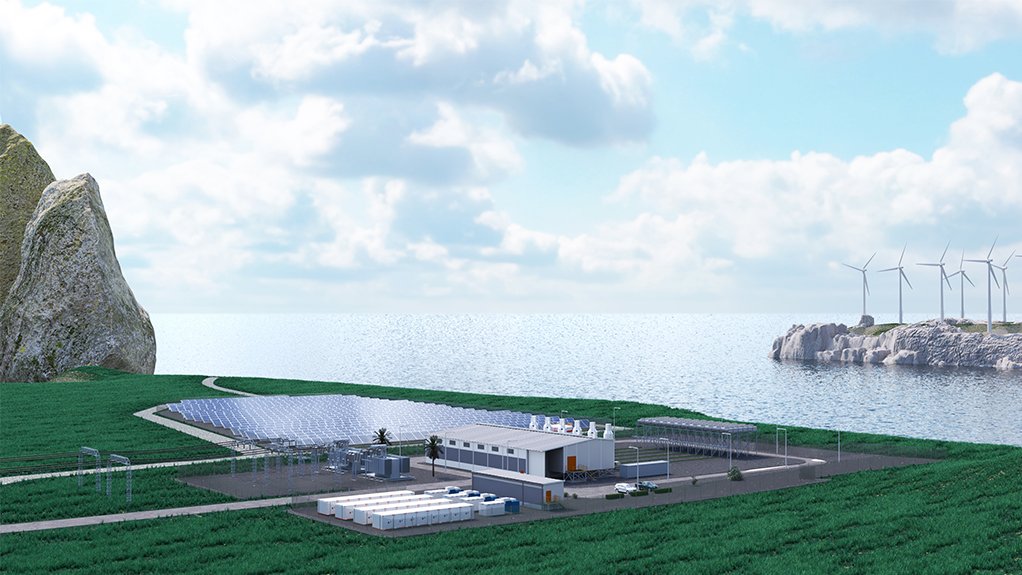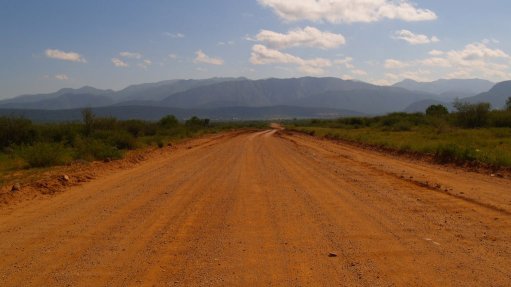Hybrid energy systems needed to transition Africa away from coal


Wärtsilä’s hybrid power plants combine flexible engine power plants and energy storage, easily integratable with renewable assets
A combination of renewables, storage and flexible gas are needed to create a stable and resilient energy system that provides a reliable source of electricity while transitioning away from carbon-intensive coal-fired power, marine and energy technology company Wärtsilä Energy Europe and Africa VP Kenneth Engblom has told Engineering News.
“Making such smart strategy decisions will lead to more resilient electricity systems and save billions of dollars in the process,” he said in a February 3 interview.
Engblom said Wärtsilä experts believed that, by 2030, the ideal energy mix in Africa would comprise a mix of flexible power plants based on internal combustion engines, large solar photovoltaic (PV) plants and storage solutions.
Wind and solar PV would complement one another well and, therefore, Engblom said an ideal system would incorporate both.
He said Africa needed cheap and reliable energy to support its developing economy. However, the continent suffered from poor electricity infrastructure despite increasing electricity demand.
Moreover, global pressure to decarbonise had further complicated matters.
The upside was that Africa was home to significant renewable energy resources, such as sun, wind and water. Engblom said that, owing to the lower cost of building renewable energy capacity and the low cost of operating such technologies, many African governments had adopted ambitious renewable energy targets.
While renewable energies provided cheap electricity – which should be maximised as much as possible – they were inherently intermittent. Moreover, the demand for electricity also varied widely throughout the day, Engblom explained.
“To maintain a balanced system, flexible forms of electricity must be available to ramp up output at the same rate that wind or solar output fluctuates. Systems need to respond across different timeframes, from seconds, to minutes,” he said.
In a grid with a high renewable quotient, gas engines would be the “ideal” technology to provide both the baseload and peaking capacity to meet fluctuating energy demand, as well as balance the fluctuating renewable energy production, Engblom explained.
“A lack of flexibility would incur a high indirect cost, as it would limit the amount of cheap renewable energy that can be economically integrated into the system,” he said.
Engblom believes that, using a hybrid approach, ambitious renewable objectives in Africa are not only achievable, but will also be optimal from a cost-system and grid stability point of view.
However, it would be conditional on electricity systems being balanced by a sufficient amount of flexible thermal and storage capacity to counterbalance the intermittence of renewable energy.
Studies conducted by Wärtsilä in Nigeria, Senegal, Côte d’Ivoire and other countries globally – using advanced energy systems modelling – indicate that this strategy would provide efficiencies worth billions of dollars over the next few decades, he said.
Engblom said the most advanced African countries in terms of their decarbonisation journeys were South Africa, Morocco, Ethiopia, Egypt and Kenya, which are all ramping up investments in renewable energy and decarbonisation.
Wärtsilä provides solutions in energy storage, engine-based power plants and hybrid power plants. The company also provides a range of support services, including lifecycle services such as operation and maintenance.
The company’s flexible engine power plants are capable of running on 100% synthetic and carbon-neutral methane and methanol. They are also capable of using hydrogen or natural gas blends containing up to 25% hydrogen. Engblom said the company was developing a pure hydrogen solution as well.
He said that, while some might decry the burning of natural gas – since it is still a fossil fuel that emits some carbon dioxide – it is much cleaner than coal.
Moreover, Engblom said that denying Africa the opportunity to use gas at a grid level would introduce instability to the grid, which would lead to individual homes and businesses turning to diesel-powered generators. This would be far less environment-friendly and far more expensive.
Wärtsilä’s hybrid solutions combine energy storage and flexible engine power plants which can be integrated with renewable assets. Engblom said these solutions can provide considerable potential for fuel and cost savings.
The value of the energy produced by a hybrid power plant can be enhanced with the Wärtsilä GEMS Digital Energy Platform, which uses data-driven intelligence to monitor, control and optimise energy production at both site and portfolio levels.
The GEMS platform is a smart software platform that monitors, controls and optimises energy assets on both site and portfolio levels. The idea behind GEMS is to optimise system performance while reducing costs.
The platform also dynamically adapts to changes in the market conditions, thereby future-proofing energy assets.
Article Enquiry
Email Article
Save Article
Feedback
To advertise email advertising@creamermedia.co.za or click here
Press Office
Announcements
What's On
Subscribe to improve your user experience...
Option 1 (equivalent of R125 a month):
Receive a weekly copy of Creamer Media's Engineering News & Mining Weekly magazine
(print copy for those in South Africa and e-magazine for those outside of South Africa)
Receive daily email newsletters
Access to full search results
Access archive of magazine back copies
Access to Projects in Progress
Access to ONE Research Report of your choice in PDF format
Option 2 (equivalent of R375 a month):
All benefits from Option 1
PLUS
Access to Creamer Media's Research Channel Africa for ALL Research Reports, in PDF format, on various industrial and mining sectors
including Electricity; Water; Energy Transition; Hydrogen; Roads, Rail and Ports; Coal; Gold; Platinum; Battery Metals; etc.
Already a subscriber?
Forgotten your password?
Receive weekly copy of Creamer Media's Engineering News & Mining Weekly magazine (print copy for those in South Africa and e-magazine for those outside of South Africa)
➕
Recieve daily email newsletters
➕
Access to full search results
➕
Access archive of magazine back copies
➕
Access to Projects in Progress
➕
Access to ONE Research Report of your choice in PDF format
RESEARCH CHANNEL AFRICA
R4500 (equivalent of R375 a month)
SUBSCRIBEAll benefits from Option 1
➕
Access to Creamer Media's Research Channel Africa for ALL Research Reports on various industrial and mining sectors, in PDF format, including on:
Electricity
➕
Water
➕
Energy Transition
➕
Hydrogen
➕
Roads, Rail and Ports
➕
Coal
➕
Gold
➕
Platinum
➕
Battery Metals
➕
etc.
Receive all benefits from Option 1 or Option 2 delivered to numerous people at your company
➕
Multiple User names and Passwords for simultaneous log-ins
➕
Intranet integration access to all in your organisation



















